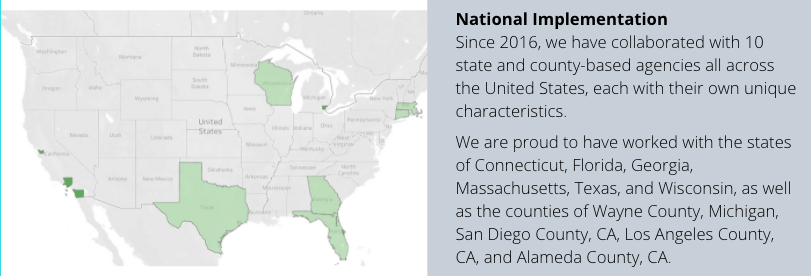Youth in Custody Practice Model
Overview
Since 2016, the Council of Juvenile Justice Administrators and Center for Juvenile Justice Reform at Georgetown University’s McCourt School of Public Policy have operated the Youth in Custody Practice Model Initiative—a research-based effort designed to improve services for youth in custody, from facility admission to community reentry.
Through the YICPM, CJJA and CJJR have worked with 10 state and county-based juvenile justice agencies to enhance their approaches across many domains, such as:
- Creating a safe and healthy facility environment
- Ensuring a better supported and equipped workforce
- Engaging youth and families
- Delivering high quality facility-based education, programming, and health services
- Effectively motivating positive youth behavior
- Developing a more seamless and coordinated reentry process

Bridging the gap between research and practice
Informed by research on “what works” in serving youth in custody, as well as professional standards and the field’s preeminent thinking on best practices, the Youth in Custody Practice Model (YICPM) initiative is designed to assist state and county juvenile correctional agencies and facility providers in implementing a comprehensive and effective service delivery approach.
Utilizing the YICPM monograph as a roadmap, the Council of Juvenile Juvenile Administrators (CJJA), the Center for Juvenile Justice Reform at Georgetown University’s McCourt School of Public Policy (CJJR), and a team of consultants provide participating agencies with 18 months of Training and Technical Assistance (TTA) to align core, research-based principles with everyday practice, and achieve more positive outcomes for youth, families, staff and communities.
With support and guidance from CJCA and CJJR, the YICPM was authored by a team of national juvenile justice experts, including: Kelly Dedel, Ph.D.; Monique Marrow, Ph.D.; Fariborz Pakseresht; and Michael Umpierre, Esq.
Youth in Custody Practice Model Programs
For the fourth round of the initiative, CJJA and CJJR will offer two distinct TTA versions of the YICPM, including the traditional 18-month approach, and a new 12-month option providing more targeted support. A more detailed description is provided later in the section titled “Training and Technical Assistance Packages.”
Participant Investment and Expectations
Implementing the YICPM will require a significant commitment from each of the participating sites. Our experience with the initial three YICPM cohorts and other initiatives makes us keenly aware of the investment of time and effort that is required for success.
